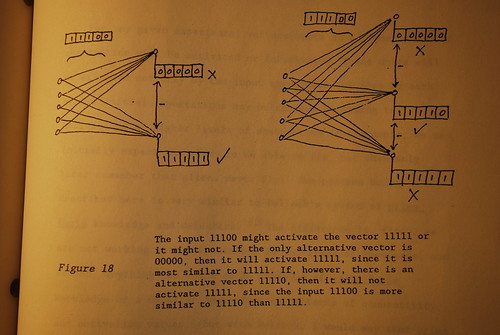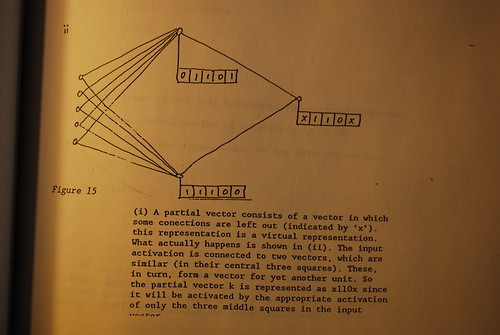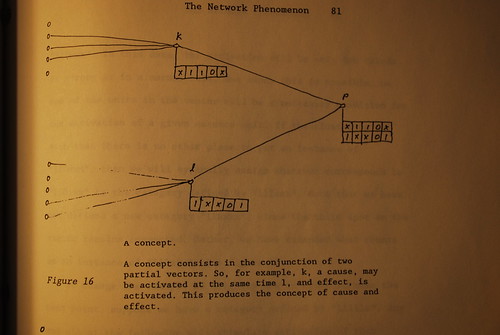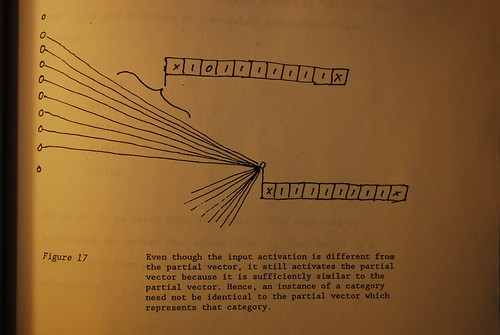In 1989 I was reaching the peak of my career. My PhD coursework was complete and behind me, I was gainfully employed (if underpaid) teaching logic and philosophy for the U of A and Athabasca University, I was elected for my first term as president of the Graduate Students' Association, and I was riding a wave of personal and political popularity.
More importantly for me, I was finally understanding the problems that had drawn me to formal learning in the first place. Though I had started university simply because it was a requirement for advancement in the work world, over the years I had been drawn increasingly to political activism and philosophical exploration. In 1989, the pieces came together. I watched the rise of 'people power' around the world. I had seen Francisco Varela speak on AIDS and immunology at the University of Alberta hospital. I began to see how networks, whether of individuals of cells, could take shape, form patterns, act with purpose. And how this would reshape how we understood the world.
In 1990 I attended, along with a number of the other graduate students at the University of Alberta, the Connectionism conference at Simon Fraser (downtown), combining it with a National Graduate Council meeting and a week-long vacation in New Westminster I spent reinterpreting the Tao Te Ching. That summer I sat at the very top of the hill at the Edmonton Folk Festival and in a frenzy of writing, completed the first draft of what would eventually become The Network Phenomenon: Empiricism and the New Connectionism. In the fall of that year, I presented it to my doctoral committee as a proposal for the work I wished to do to complete my PhD.
It has been almost 20 years, and I thought I had put it behind me, but recently I see that my former supervisor, and chair of that committee, is now one of the people blogging on a philosophy website.
Now you can read the proposal for yourself - that's why I put it online. Having just retyped it (I'll use OCR for my other work, but I wanted to revisit this paper personally) I can see that it is an overly ambitious work covering a wide swath of theory and evidence. As a proposal, it also lacks a lot of the depth and research that one would want of a completed dissertation. Yet, still, 20 years later, the paper strikes me as genuine, original, and important. A dissertation based on this work - or even just a chapter of this work, which might have been more appropriate - would have been a worthwhile contribution to the field.
The committee didn't see it that way. Led by the chair, they engaged in an attack on the basic premises of the work, of the idea of associationist forms of reasoning and connectionist models of cognition. The idea that cognition could be non-propositional, the idea that proof would proceed by metaphor and similarity, rather than form and validity, they rejected as ridiculous. For good measure they offered the opinion that even if the work were worthwhile, it would be well beyond my capability. The committee felt that my PhD would be better spent in an investigation of mental content - something I had denied in the paper even existed! - rather than this fool's errand.
I submitted a dissertation proposal based on mental content a couple of weeks later, a 30-page overview of the field they were quite enthused about. But my heart had fallen out of the project. I wrote for myself a long diatribe attacking a book the committee was enthusiastically recommending, Jerry Fodor's Psychosemantics, called "Trash Fodor" (when I find it, I'll post it). I thought the book represented the epitome of the inanity of the cognitivist approach. I gradually turned my back on the program and on philosophy in general. I retreated to my little cabin in northern Alberta, taught logic, and worked on my computer.
I have never forgotten - or stopped believing - the work I presented in that paper. About five years later I began writing again - you can see it as the beginning of the work on Stephen's Web - and began rebuilding my understanding of learning, inference and discovery. My work continued to be informed by my understanding of connectionism, people power, the Tao, and related concepts. The structure of content networks, the organization of metadata, and my description of connective knowledge, all are based on this basic foundation.
I struggle every day with the question of whether my work is genuine, original and important, whether, indeed, it is even academically and scientifically sound. I look at the work of others - like Varela's, for example - and I am daunted and humbled. But such work, too, is rare. And what I leave behind is so different in format and method and in style and structure a comparison is probably impossible. The best I can do is to work as honestly and as openly as possible, consistent in my pratcice and my principles.
So when I realized how angry I was, even these many years later, I concluded that the best - and only - response would be to put the material into the open, and let people decide for themselves. Because there's a certain sense in which I feel I have missed out. And I'm sure some people will find it trivial and others obscure, some will find it too dense and others too simplistic, some will see in it a naive foray into amateur epistemology while others will see it as part of a wider discipline. Some will think I should have been able to complete my PhD, while others will question whether I have any academic merit at all. And I - well, I will see it as mine. As me.
Being angry was cathartic, because it made me see what I've had to come through, and I'm over it now.
You know, in life, you have certain kinds of regrets. One kind of regret revolves around the opportunities you never had - what if I had had better schools, better teachers, better jobs, better finances. What if I had been treated fairly here, rewarded justly there, shown this in that place. Things I could never be, places I could never go. These are regrets over things I cannot control. But the other kind of regret - ah. The regret of a man who was not true to himself, who did not give his all, who held himself back or conformed for the sake of advancement, of the man who stopped seeking because he was told what to believe: these are the regrets I could not bear to feel.
I guess I had a choice, back in 1990, about which kind of regret I would feel 20 years later. I do not, for an instant, think I made the wrong choice.
More importantly for me, I was finally understanding the problems that had drawn me to formal learning in the first place. Though I had started university simply because it was a requirement for advancement in the work world, over the years I had been drawn increasingly to political activism and philosophical exploration. In 1989, the pieces came together. I watched the rise of 'people power' around the world. I had seen Francisco Varela speak on AIDS and immunology at the University of Alberta hospital. I began to see how networks, whether of individuals of cells, could take shape, form patterns, act with purpose. And how this would reshape how we understood the world.
In 1990 I attended, along with a number of the other graduate students at the University of Alberta, the Connectionism conference at Simon Fraser (downtown), combining it with a National Graduate Council meeting and a week-long vacation in New Westminster I spent reinterpreting the Tao Te Ching. That summer I sat at the very top of the hill at the Edmonton Folk Festival and in a frenzy of writing, completed the first draft of what would eventually become The Network Phenomenon: Empiricism and the New Connectionism. In the fall of that year, I presented it to my doctoral committee as a proposal for the work I wished to do to complete my PhD.
It has been almost 20 years, and I thought I had put it behind me, but recently I see that my former supervisor, and chair of that committee, is now one of the people blogging on a philosophy website.
Now you can read the proposal for yourself - that's why I put it online. Having just retyped it (I'll use OCR for my other work, but I wanted to revisit this paper personally) I can see that it is an overly ambitious work covering a wide swath of theory and evidence. As a proposal, it also lacks a lot of the depth and research that one would want of a completed dissertation. Yet, still, 20 years later, the paper strikes me as genuine, original, and important. A dissertation based on this work - or even just a chapter of this work, which might have been more appropriate - would have been a worthwhile contribution to the field.
The committee didn't see it that way. Led by the chair, they engaged in an attack on the basic premises of the work, of the idea of associationist forms of reasoning and connectionist models of cognition. The idea that cognition could be non-propositional, the idea that proof would proceed by metaphor and similarity, rather than form and validity, they rejected as ridiculous. For good measure they offered the opinion that even if the work were worthwhile, it would be well beyond my capability. The committee felt that my PhD would be better spent in an investigation of mental content - something I had denied in the paper even existed! - rather than this fool's errand.
I submitted a dissertation proposal based on mental content a couple of weeks later, a 30-page overview of the field they were quite enthused about. But my heart had fallen out of the project. I wrote for myself a long diatribe attacking a book the committee was enthusiastically recommending, Jerry Fodor's Psychosemantics, called "Trash Fodor" (when I find it, I'll post it). I thought the book represented the epitome of the inanity of the cognitivist approach. I gradually turned my back on the program and on philosophy in general. I retreated to my little cabin in northern Alberta, taught logic, and worked on my computer.
I have never forgotten - or stopped believing - the work I presented in that paper. About five years later I began writing again - you can see it as the beginning of the work on Stephen's Web - and began rebuilding my understanding of learning, inference and discovery. My work continued to be informed by my understanding of connectionism, people power, the Tao, and related concepts. The structure of content networks, the organization of metadata, and my description of connective knowledge, all are based on this basic foundation.
I struggle every day with the question of whether my work is genuine, original and important, whether, indeed, it is even academically and scientifically sound. I look at the work of others - like Varela's, for example - and I am daunted and humbled. But such work, too, is rare. And what I leave behind is so different in format and method and in style and structure a comparison is probably impossible. The best I can do is to work as honestly and as openly as possible, consistent in my pratcice and my principles.
So when I realized how angry I was, even these many years later, I concluded that the best - and only - response would be to put the material into the open, and let people decide for themselves. Because there's a certain sense in which I feel I have missed out. And I'm sure some people will find it trivial and others obscure, some will find it too dense and others too simplistic, some will see in it a naive foray into amateur epistemology while others will see it as part of a wider discipline. Some will think I should have been able to complete my PhD, while others will question whether I have any academic merit at all. And I - well, I will see it as mine. As me.
Being angry was cathartic, because it made me see what I've had to come through, and I'm over it now.
You know, in life, you have certain kinds of regrets. One kind of regret revolves around the opportunities you never had - what if I had had better schools, better teachers, better jobs, better finances. What if I had been treated fairly here, rewarded justly there, shown this in that place. Things I could never be, places I could never go. These are regrets over things I cannot control. But the other kind of regret - ah. The regret of a man who was not true to himself, who did not give his all, who held himself back or conformed for the sake of advancement, of the man who stopped seeking because he was told what to believe: these are the regrets I could not bear to feel.
I guess I had a choice, back in 1990, about which kind of regret I would feel 20 years later. I do not, for an instant, think I made the wrong choice.












